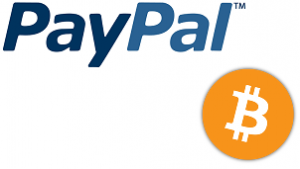The Biggest News: PayPal announces Bitcoin integration with BitPay, Coinbase, and GoCoin
 PayPal has been hinting at and moving towards working more directly with Bitcoin quite a bit over the past months, but the big news just came out today. In a press release from Scott Ellison, senior director of corporate strategy at PayPal, PayPal has officially announced the first stage of their promised Bitcoin integration. You can read their full post here.
PayPal has been hinting at and moving towards working more directly with Bitcoin quite a bit over the past months, but the big news just came out today. In a press release from Scott Ellison, senior director of corporate strategy at PayPal, PayPal has officially announced the first stage of their promised Bitcoin integration. You can read their full post here.
The press release doesn’t seem to have all that much to say at first, but it’s actually filled with juicy details.
1. This is just the first step.
PayPal makes it clear that this is them proverbially “testing the waters” of Bitcoin integration. They want to see how popular it is. They want to see how many customer service issues it creates for them. They want to hear feature requests from merchants. They want to feel it out.
Once you’ve tested the waters, what do you normally take as your second step? I prefer to cannonball, but PayPal seems more the type to enter with a precise dive. If this turns out well, I think we can expect PayPal to add an integrated cryptocurrency wallet to their platform.
2. They’re not just working with BitPay and Coinbase.
The third company listed is the 3rd place Bitcoin processor… and the 1st place cryptocurrency processor. Not just a Bitcoin payment processor, GoCoin has said that it aims to be currency-agnostic; framed in stark contrast to BitPay and Coinbase both of whom seem interested in sheltering Bitcoin from the potential competition of the altcoins.
What could this mean? Well, if everything goes well and GoCoin is able to integrate all their services effectively from their end, it’s definitely possible we could see Braintree/PayPal merchants who are able to accept not just Bitcoin, but also Dogecoin and Litecoin. Yeah, Dogecoin might become a real thing. Wow, so currency, much real, such not joke.
And yeah, Litecoin also. We might be seeing the beginnings of a real fight for cryptocurrency dominance – getting them in the front door was the difficult first step.
3. This announcement is only for a few kinds of goods – but what PayPal has done is open up new potential product classes.
PayPal focused on this integration as being for digital goods – selling music, e-books, virtual currency (not mentioned, but likely), and so on. What’s interesting about this is that those items have been, until now, basically on PayPal’s “do-not-sell” list. You could sell them, but PayPal seller protection would not be your friend. Without a physical item and a tracking number, there was basically no chance of the seller winning a dispute if the buyer was not satisfied.
Bitcoin (and Dogecoin and Litecoin) provide a great method of addressing this problem. PayPal is leveraging the lack of chargebacks inherent in these systems to provide merchants of digital goods with security for their sales. Obviously this comes at a cost – PayPal will have little way to satisfy potentially dissatisfied customers in case of failed fulfillment on the part of the merchant. It’s great to see an established company like PayPal using a disruptive technology to fill in the gaps of their existing business – that’s exactly what they’ve done here by using digital currencies (they refer to them as virtual currencies in the press release, but hopefully they’ll get around to fixing their lingo) to allow merchants to sell digital goods. It makes some basic, intuitive sense, doesn’t it? Digital for digital.
4. PayPal strikes back against sham pre-sales of mining equipment.
A last note, seemingly included at random, is PayPal noting that they have allowed people to sell (and pre-sell) mining equipment. It’s a silly thing to point out – kind of like saying, “Yes, we allow people to sell computer processors” – but it’s in the letter so that they can discuss pre-sales. PayPal allows pre-sales unless it doesn’t like exactly what you’re doing; if you’re selling too far in advance, selling an infeasible product, breaking laws, or whatever, they’ll shut you down. If you fulfill all your orders on time and your customers are happy, then they usually don’t take issue.
Obviously, several mining hardware manufacturers fall into the former category. As such, PayPal is shutting down pre-sales of mining hardware through their system. It’s hard to say that’s a bad idea. Pre-selling mining equipment has always been a very sketchy idea, due to the nature of the industry – difficulty changes making equipment lose value very quickly, for one.
There’s a little more covered in the letter – like that they expect all companies they work with in the Bitcoin space to be fully licensed and AML-KYC compliant – but we knew that would be in there.
This is the dawning of a new era, and I, for one, am glad to see that PayPal has welcomed its new blockchain overlords.








